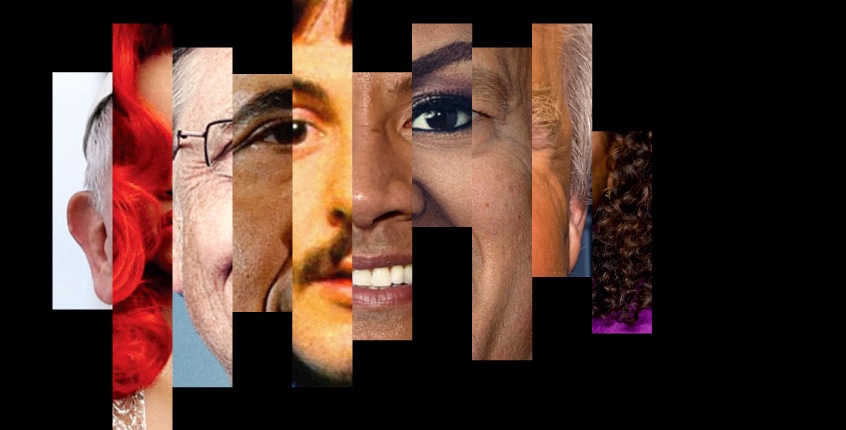Introduction
Today, entertainers, athletes, politicians, impresarios, and spiritual leaders drive many of the trends, beliefs, and messages we consume. Think about the world we live in and the impact they have on the products and services we buy, use, and sell. In this way, they are undeniably powerful brands.
To complement our annual ranking of brands based on emotion, we’ve released our BFF (Brand-intimate Famous Figures) study, which shares the most intimate living celebrity brands in the U.S. While the study covers 25 of today’s most well-known personalities, this article will focus primarily on the top 10. These results reveal the uniqueness of American culture today, with the top 10 representing two presidents, a former first lady, actors, a business luminary, musicians, and a religious leader.
To be a highly intimate public figure, it takes more than just fame or notoriety; it takes a brand that Americans have strong emotional connections to, describing their relationships in terms of forming attachments. It indicates that these people, by design or by default, have created brands with powerful emotional bonds—they influence behaviors, engagement, trends, and the lives of their fans.
Meet the top BFFs
The top 10 reflects a range of professions, ages, backgrounds, and affiliations. Politicians and entertainers clearly have a special place in the hearts of Americans, but the variety of celebrities within those categories as well as the inclusion of icons of other arenas (Bill Gates and Pope Francis) show that these emotional connections can be formed in a number of different ways with a variety of people.
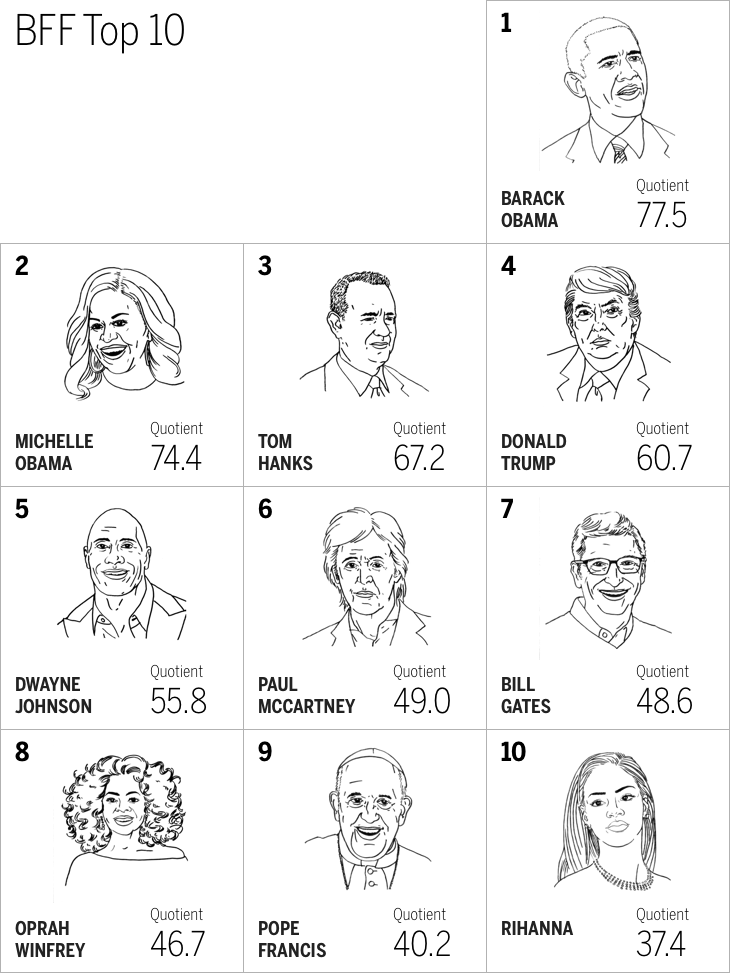
Barack Obama takes first place, connecting particularly well with those 25–44 years old. Interestingly, there are only three women in our top 10, with Michelle Obama taking the highest honors in second place. President Donald Trump ranks fourth, with a strong showing. He is dominant among men and those over age 65. The president also ranks #1 as the person his fans can’t live without and the famous figure that is most a part of their daily lives. Paul McCartney is the highest-ranked musician, coming in sixth place, and notably, Pope Francis makes the top 10, coming in ninth place.
Gender juxtaposition
Few perform well across genders with the exception of Barack Obama and Tom Hanks. What seems more typical is notable differences across gender. For example, President Trump is #1 for men and is #7 among women, which is a considerable gap. Michelle Obama is the most intimate famous figure among women, who also feel strong emotional connections to Dwayne Johnson and Oprah Winfrey.
BFF top 5 for men and women
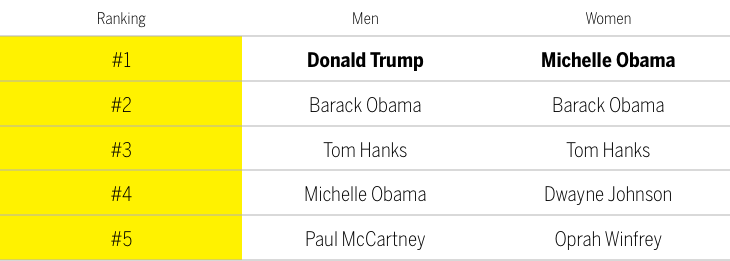
Comparing commanders in chief
Being that two of the most intimate figures in our study are U.S. presidents, we wanted to compare how the two connect emotionally with their fans. While Obama leads our study, Trump shows an impressive performance as well. Both men score similarly related to the stages of intimacy, having over 50% of admirers in some form of intimacy with them.
Obama vs. Trump
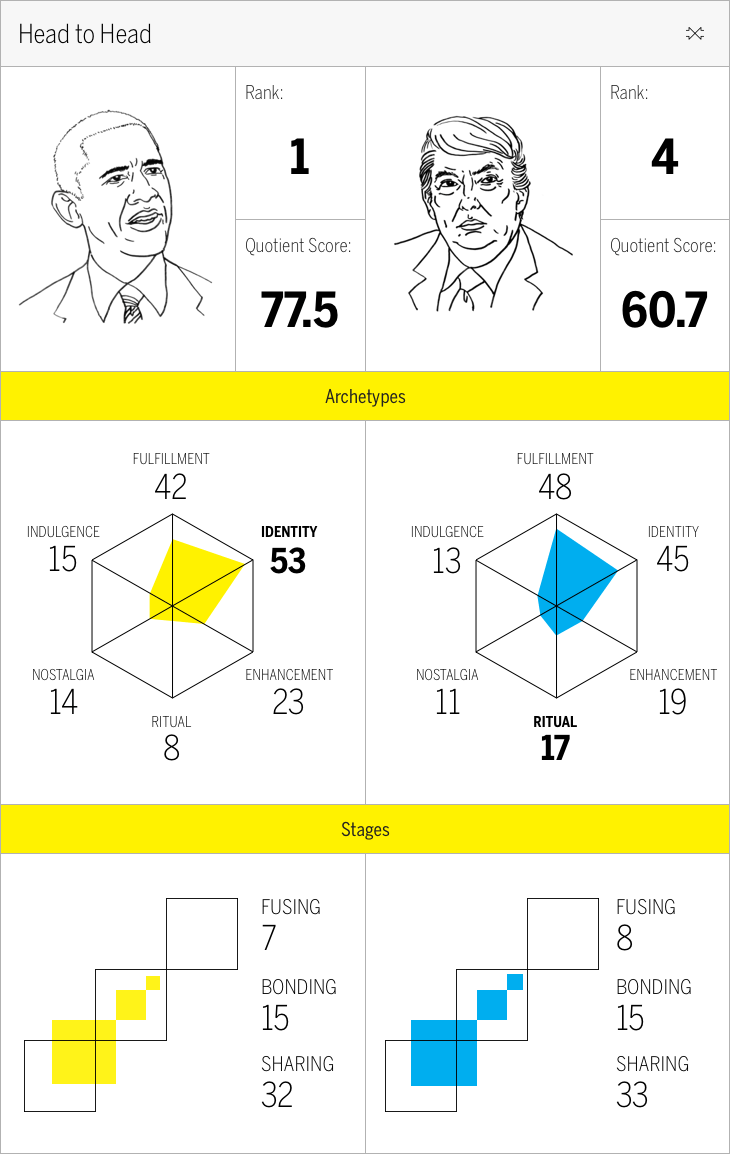
If we look at the Brand Intimacy profiles of each president, some key differences emerge in the archetypes, which are patterns or markers that identify the character and nature of ultimate brand relationships. Obama has the strongest association with the identity archetype, which characterizes him as having strong values people can identify with, whereas Trump’s strongest association is with the fulfillment archetype, which describes him as exceeding expectations, and the ritual archetype, which means he is an important part of people’s routines and daily lives. This sheds some light on how each president builds his emotional bonds. Obama’s high identity score suggests the overall high esteem in which he is held. Trump’s relatively high score on fulfillment and ritual speak to his delivering on his promises and his ability to keep people intrigued by what he will say and do (and tweet) next.
As mentioned, Trump is more popular among men than women, and he also performs more strongly among older people (#1 among ages 55 and older). Obama has a broader appeal when it comes to gender, ranking #2 overall for both men and women. He also appeals more broadly across ages, skewing a bit younger than Trump, with the #1 rank among ages 18–34 and 35–54.
Best of the best
Results from the BFF study showed considerable variation, with many celebrities indicating strengths in specific areas. We can glean some interesting insights if we examine the top performers for each of the three stages of Brand Intimacy, which identify the depth and degree of intensity in the relationship between a consumer and a brand.
Top performers for each stage of Brand Intimacy
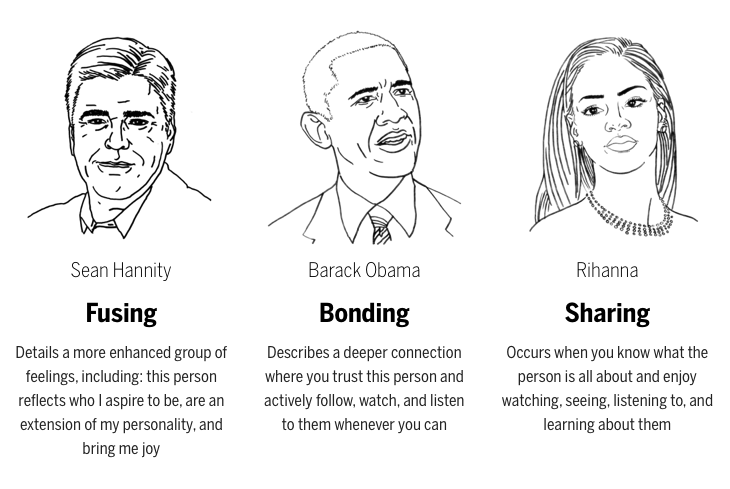
Rihanna was the top performer for sharing, the first stage of Brand Intimacy. This stage refers to when consumers know what the person is all about, feel her or she is speaking directly to them, and enjoy watching, seeing, listening to, and learning about this person. This is understandable given that Rihanna is a popular global pop star, providing her a platform to attract a broad range of people who enjoy her music.
The next stage, bonding, describes a deeper connection where consumers actively follow, watch, and listen to this person whenever they can. Consumers trust this person, for whom they have strong positive feelings. Barack Obama has the highest percentage of users in this stage. As a twice-elected U.S. president, Obama is a highly trusted figure among his supporters. This is also evidenced by his high score with the identity archetype.
The most advanced stage, fusing, is led by Sean Hannity. This details a more enhanced group of feelings, including: “this person reflects who I aspire to be,” “this person is an extension of my own personality,” and “the feelings I have for this person give me joy.” A sometimes polarizing figure, Sean Hannity attracts strong positive emotions by a significant (although limited) group of his admirers who feel close to him.
Top performers for each of the Brand Intimacy archetypes
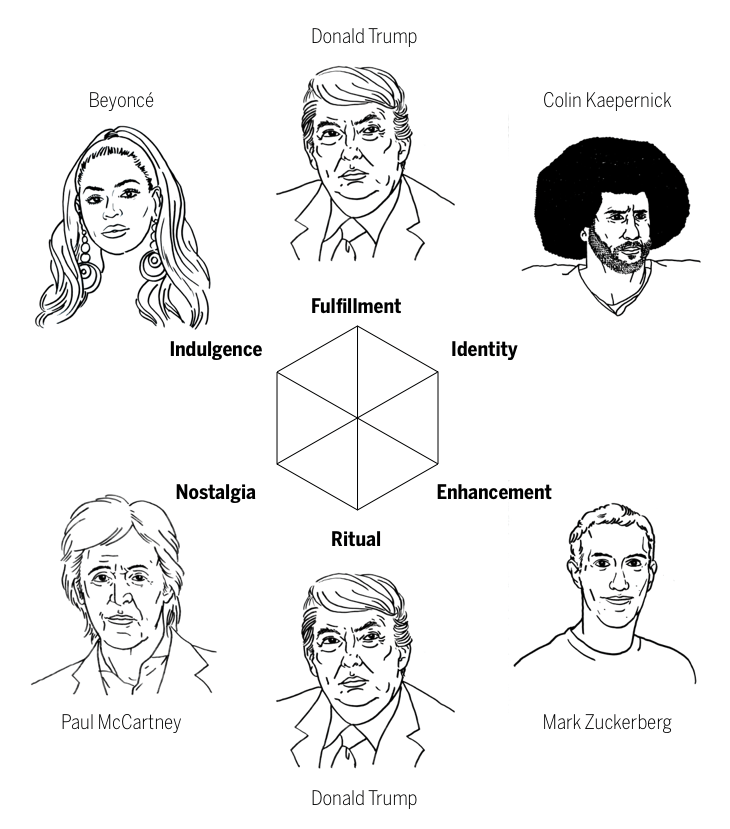
Looking at the top performers for the Brand Intimacy archetypes (the six patterns or markers that most identify the character and nature of ultimate brand relationships), Trump leads for ritual and fulfillment. Paul McCartney unsurprisingly is the person most associated with the nostalgia archetype, meaning he reminds people of their past or fond memories. Some interesting findings emerge about celebrities outside of the top 10, like how Colin Kaepernick is most associated with the identity archetype. As an athlete known for his protests and positions on racial injustices in America, Kaepernick’s values impressively resonate more strongly with the American people than those of any of the politicians in our survey. Mark Zuckerberg is the top figure for the enhancement archetype, which characterizes him as making people more capable or connected. This is likely due to Zuckerberg’s brand being so closely tied to that of his company, Facebook. Beyoncé leads for the indulgence archetype, which indicates that she makes people feel rewarded and gratified. This speaks to the immense pleasure Beyoncé’s fans get from her music and her iconic public image.
Conclusion
Celebrities are an undeniable force in the shaping of American culture and lives. Importantly, the BFF top 10 represent a diverse range of personalities and industries, and they reflect the complexity of America’s culture today. While it’s common to speculate on the role of celebrity, it’s not often that we consider how we are emotionally connected to these icons. From our presidency to reality shows to the power of endorsements, we clearly see personal brand building continuing to gain prominence and yield tremendous influence in our country.
Get an overview of Brand Intimacy here.
Read our detailed methodology here. Our Amazon best-selling book is available at all your favorite booksellers. To learn more about our Agency, Lab, and Platform, visit mblm.com.
